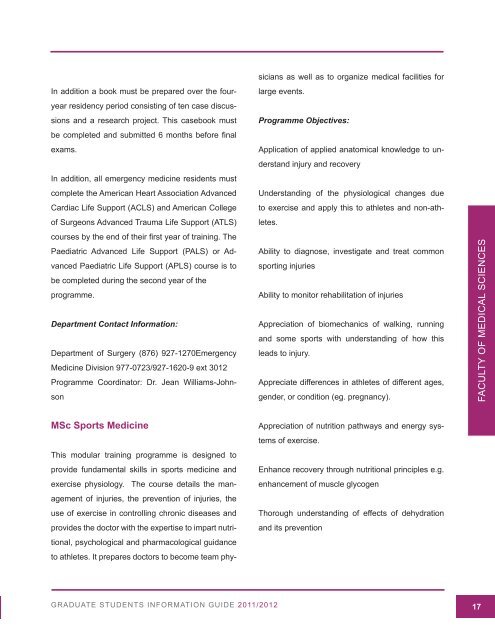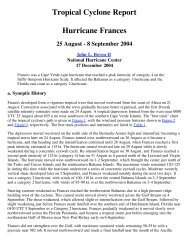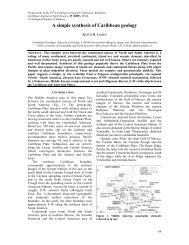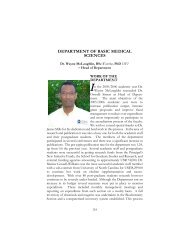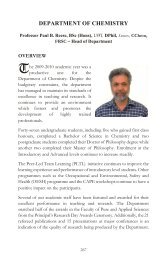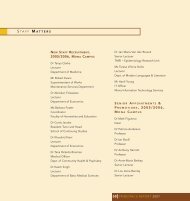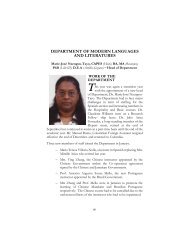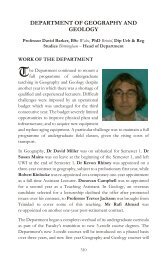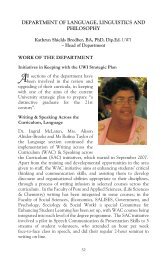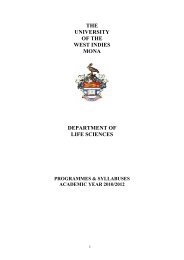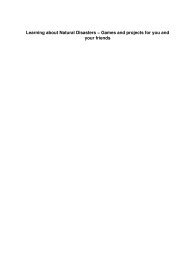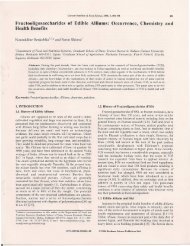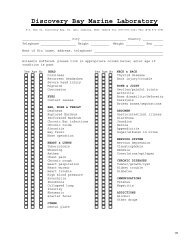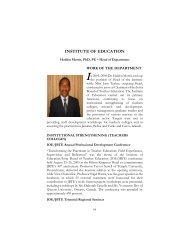Medical Sciences - University of the West Indies
Medical Sciences - University of the West Indies
Medical Sciences - University of the West Indies
Create successful ePaper yourself
Turn your PDF publications into a flip-book with our unique Google optimized e-Paper software.
In addition a book must be prepared over <strong>the</strong> fouryear<br />
residency period consisting <strong>of</strong> ten case discussions<br />
and a research project. This casebook must<br />
be completed and submitted 6 months before final<br />
exams.<br />
In addition, all emergency medicine residents must<br />
complete <strong>the</strong> American Heart Association Advanced<br />
Cardiac Life Support (ACLS) and American College<br />
<strong>of</strong> Surgeons Advanced Trauma Life Support (ATLS)<br />
courses by <strong>the</strong> end <strong>of</strong> <strong>the</strong>ir first year <strong>of</strong> training. The<br />
Paediatric Advanced Life Support (PALS) or Advanced<br />
Paediatric Life Support (APLS) course is to<br />
be completed during <strong>the</strong> second year <strong>of</strong> <strong>the</strong><br />
programme.<br />
Department Contact Information:<br />
Department <strong>of</strong> Surgery (876) 927-1270Emergency<br />
Medicine Division 977-0723/927-1620-9 ext 3012<br />
Programme Coordinator: Dr. Jean Williams-Johnson<br />
MSc Sports Medicine<br />
This modular training programme is designed to<br />
provide fundamental skills in sports medicine and<br />
exercise physiology. The course details <strong>the</strong> management<br />
<strong>of</strong> injuries, <strong>the</strong> prevention <strong>of</strong> injuries, <strong>the</strong><br />
use <strong>of</strong> exercise in controlling chronic diseases and<br />
provides <strong>the</strong> doctor with <strong>the</strong> expertise to impart nutritional,<br />
psychological and pharmacological guidance<br />
to athletes. It prepares doctors to become team phy-<br />
sicians as well as to organize medical facilities for<br />
large events.<br />
Programme Objectives:<br />
Application <strong>of</strong> applied anatomical knowledge to understand<br />
injury and recovery<br />
Understanding <strong>of</strong> <strong>the</strong> physiological changes due<br />
to exercise and apply this to athletes and non-athletes.<br />
Ability to diagnose, investigate and treat common<br />
sporting injuries<br />
Ability to monitor rehabilitation <strong>of</strong> injuries<br />
Appreciation <strong>of</strong> biomechanics <strong>of</strong> walking, running<br />
and some sports with understanding <strong>of</strong> how this<br />
leads to injury.<br />
Appreciate differences in athletes <strong>of</strong> different ages,<br />
gender, or condition (eg. pregnancy).<br />
Appreciation <strong>of</strong> nutrition pathways and energy systems<br />
<strong>of</strong> exercise.<br />
Enhance recovery through nutritional principles e.g.<br />
enhancement <strong>of</strong> muscle glycogen<br />
Thorough understanding <strong>of</strong> effects <strong>of</strong> dehydration<br />
and its prevention<br />
GRADUATE STUDENTS INFORMATION GUIDE 2011/2012 17<br />
FACULTY OF MEDICAL SCIENCES


